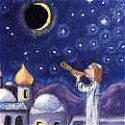יְהִי רָצוֹן מִלְּפָנֵיךָ יהוה אֱלהֵינוּ
וֵאלהֵי אֲבוֹתֵינוּ שֶׁתְּחַדֵּשׁ עָלֵינוּ חדֶשׁ טוֹב
בַּאֲדנֵינוּ יֵשׁוּעַ הַמָּשִׁיחַ אָמֵן ye·hee · rah·tzohn · meel·fah·ney·kha · Adonai · E·lo·hey·noo
vei·loh·hey · a·voh·tey·noo · she·te·kha·deish · ah·ley·noo · khoh·desh· tohv
ba'a·doh·ney·noo · Ye·shoo·a' · ha·mah·shee·akh · a·mein

Cheshvan is the eighth month according to the biblical calendar. The name "Cheshvan" is the Babylonian name of the month. The older biblical (or Canaanite) name of the month is "Bul" as it says in 1 Kings 6:38, "And in the eleventh year, in the month of Bul, which is the eighth month, the house was finished..." As the previous verse stated, it was during the month of Cheshvan that King Solomon completed his seven-year construction of the First Temple. Because of this, the sages say that Cheshvan should have had a festival. Yet, the Temple stood empty for 11 months and was not dedicated until the following Tishrei (see 1 Kings 8). According to the sages, since the month of Cheshvan did not receive a feast and lost it to Tishrei, one day it will receive a festival, just as Kislev gained a feast (Hanukkah) during the days of the Maccabees. More transpired during Cheshvan in the time of the kings. In the generation following Solomon, King Jeroboam set up two golden calves in Bethel and Dan. He instituted a feast on the fifteenth day of Cheshvan. (Needless to say, this is not the feast that the sages said Cheshvan was to receive.) Also in the days of Noah, 17 Cheshvan may have been the day that the Great Flood began. Genesis 7:11 says, "In the second month, on the seventeenth day of the month, on that day all the fountains of the deep burst forth, and the windows of the heavens were opened." The sages debated whether this referred to Iyyar (the second month counting from Nisan) or Cheshvan (the second month counting from Tishrei). It was determined that this second month was Cheshvan, due to the fact that Nisan was not considered the beginning of the months until the time of the Exodus (see Exodus 12:2). Similarly, Cheshvan is the beginning of rainy season in the land of Israel. This change is reflected in the second benediction of the Amidah prayer. During Cheshvan, the phrase "who causes the wind blow and sends down the rain" is added to this benediction. With it, we extol HaShem as the Powerful One who resurrects the dead, heals the sick, sets captives free, and brings forth salvation. So whether remembering the Temple, the Great Flood, or the everyday blessings of rain, Cheshvan teaches us about the might of God. He is awesome and powerful. We depend on him for our every need. "For us there is one God, the Father, from whom are all things and for whom we exist, and one Lord, Jesus Christ, through whom are all things and through whom we exist" (1 Corinthians 8:6). Though there may not be any festivals in Cheshvan, we can rejoice and be thankful for the constant provision that God provides for us through our Master Yeshua. May you have a blessed Cheshvan. | 



No comments:
Post a Comment